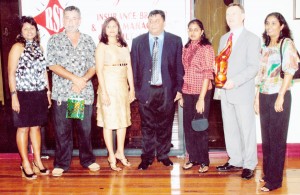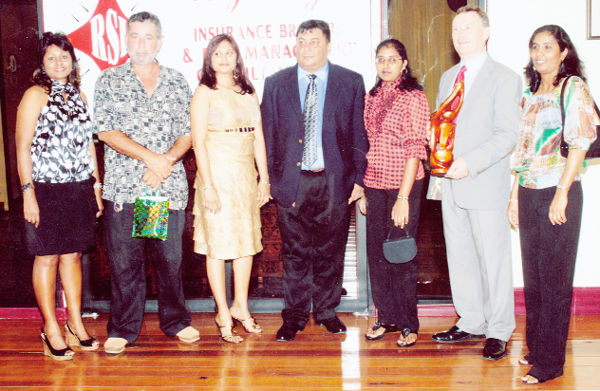In the wake of the CLICO problems, broker Raj Singh says the insurance industry needs to regain the confidence of the public and he also said the regulator’s office does not have the required resources to effectively oversee the Insurance Act.

Speaking at a recent anniversary ceremony to mark ten years in the insurance business, Singh stated that serious collateral damage has been done to the CLICO Brand and to insurance in general as a result of the financial problems facing the insurance conglomerate.
Singh stated that the woes of the local CLICO company are as a result of “very poor investment decisions and weak regulatory oversight.”
He questioned whether enough was done by the authorities to ensure that CLICO kept within the regulations regarding their overseas investments, especially after the initial discovery of its exposure in CLICO (Bahamas). “That is the key question”, he said.
CLICO (Guyana) has $6.9 billion (US$34 million) invested in CLICO (Baha-mas), which represents 53 percent of CLICO (Guyana)’s assets and which may not be recoverable. The 53 per cent infringes Section 55 of the Insurance Act, Chapter 91:02 which states that insurance companies must invest at least 85 per cent of their statutory funds locally. The company was written to by Commis-sioner of Insurance Maria van Beek to reduce this exposure but this was never done.
Meanwhile, Singh opined that the Office of the Commissioner of Insurance (OCI) “is ill-equipped with limited financial and human resources to properly and effectively monitor and regulate” the country’s Insurance Act. He said that this was a fact that the OCI would itself acknowledge and urged that this problem be dealt with “head on”. He said the lack of such regulatory oversight had led to the present situation even though Guyana was doing much better than the US vis-a-vis the insurance giant AIG.
Meanwhile, he said that the steps taken locally to address the CLICO fiasco, including President Bharrat Jagdeo’s guarantee that no investor will lose their money, may currently be enough to mitigate the effects of the potential losses for the insuring and investing public in Guyana. He, however, expressed some concern about the President’s commitment to the investors of the embattled company and said “I am not sure if the President is fully conscious and aware of the enormous exposure that he has guaranteed if in a worst case scenario, CLICO (Guyana) is unable to recoup anything from CLICO (Bahamas).”
Meanwhile, he also identified some other issues that the OCI and the insurance industry may want to address in the very near future. One of the main issues raised was the quality of insurance brokers locally and Singh pointed out that there are only two qualified brokers who are currently operating in Guyana. He said that a true broker is supposed to be the insurance advisor of the insured, as well as a person in whom the insured would have “implicit faith and trust”, particularly in their technical expertise and professional advices.
He also criticized one insurance company, which he said has adopted a policy decision of “denying perfectly legitimate claims as a delay mechanism.” This has resulted in several of these cases being taken to the court to be addressed by a legal system that is already overloaded, Singh stated. He said that “the arbitration system provided by the Insurance Act has operated to some effect but said that the legality of this body has now been called into question by the courts as being unconstitutional.”
Further, he said that the current professional liability (Errors and Omissions) limit of $10 million for brokers is woefully inadequate when brokers are advising clients with assets and liabilities worth hundreds of millions of dollars. He said that a more “rigorous licensing and registration process needs to be developed that has a greater focus more on “qualitative issues and less on quantitative issues”.
He also called for independent financial ratings of insurers locally. He said that “in the absence of recognized financial ratings agencies, some methodology needs to be developed that will assist brokers and the public to pronounce on the solvency and liquidity of the insurers.” He noted that neither the brokers nor the insuring public were aware of CLICO (Guyana)’s breach of the Insurance Regulations by their investments in the Bahamian company. He contended that this issue is closely linked to the quality of insurers within our midst.
He also called for regional cooperation to be implemented especially for regulatory purposes. He said that this should negate some of the ambitious sister party transactions that occur due to some conglomerates having numerous associated companies regionally. He said that neither the OCI nor the brokers are presently equipped and capable of dealing with this issue.
The anniversary ceremony was held at the Roraima Duke Lodge and was attended by Prime Minister Sam Hinds, who addressed the gathering. At the ceremony, the company awarded three of its longstanding employees, Oma Singh, Amrit Lakhan and Sharmila Seeram for 10, 6 1/2 and 5 years of service respectively. The company also awarded its first customer Stanley MacIntosh and presented Alan Thomas, the CEO of New World Marine Insurance Consultants of London with a gift. MacIntosh, who had travelled especially for the occasion, was being recognized for his support to RSIB over the years especially in the area of marine insurance.

